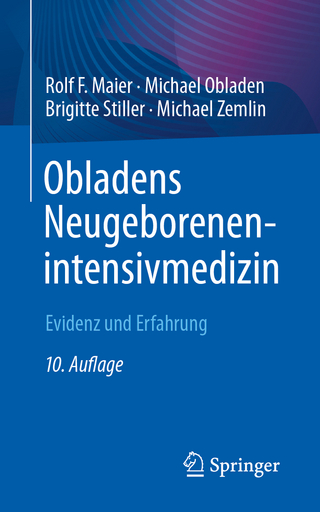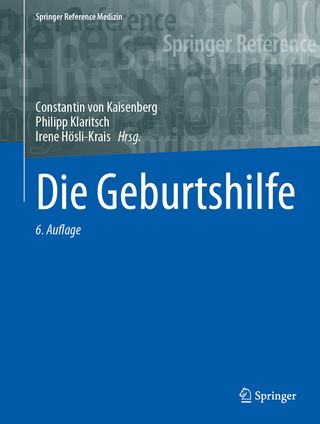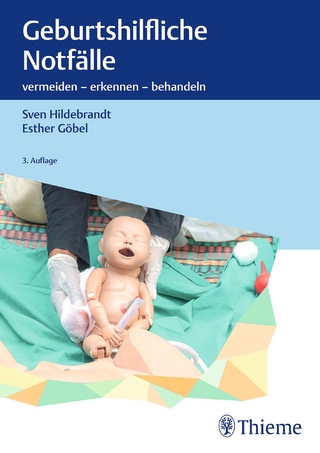
Skills for Midwifery Practice
Churchill Livingstone (Verlag)
978-0-7020-6187-5 (ISBN)
- Titel erscheint in neuer Auflage
- Artikel merken
Step-by-step guidance is given on a range of topics including abdominal examination, taking of maternal and neonatal vital signs, infection control, mother and baby hygiene, elimination and drug administration. Childbearing and intrapartum skills are also extensively covered as are neonatal assessment and nutrition, principles of phlebotomy and intravenous therapy, moving and handling, wound management and CPR.
Skills for Midwifery Practice is invaluable to midwives in training, qualified midwives returning to practice, as well as other members of the obstetric healthcare team.
Presents over 150 essential midwifery procedures in an easy-to-read, quick reference format
'Learning Objectives' and 'end-of-chapter' self-assessment exercises allow readers to monitor their progress
Refers to the latest evidence and research, including current national and international guidelines
Explains the underlying physiology associated with pregnancy and childbirth
Over 150 artworks help explain physiological processes and clinical procedures
'Roles and Responsibilities' boxes define the nature and extent of current practice
Ideal for use as a basis for teaching and assessment
New format - now with colour - makes learning even easier!
Explores the use and significance of the Modified Early Obstetric Warning Scoring Chart
Discusses advances in equipment usage including the application of sequential compression devices, temporal artery thermometers, and pulse oximetry in the early detection of critical congenital heart disease
Contains advances in microbiology and infection control including the application and removal of gloves and the use of ANTT for each relevant procedure
Physiology updates include an expanded section on normal and abnormal breathing patterns, the structure of the stratum corneum at birth and the factors that affect its barrier function, and neonatal reflexes present at birth
Updated information regarding the use of the automated external defibrillator during maternal resuscitation, and the use of blended air and oxygen and pulse oximetry during neonatal resuscitation
Care of the traumatised perineum - including expanded discussion of modern suture materials
Recognition and management of complications associated with infusion therapy and epidural analgesia
1 Principles of abdominal examination:during pregnancy and labour 1
2 Principles of abdominal examination:during the postnatal period 000
3 Assessment of maternal and neonatal vital signs: temperature measurement
4 Assessment of maternal and neonatal vital signs: pulse measurement
5 Assessment of maternal and neonatal vital signs: blood pressure measurement
6 Assessment of maternal and neonatal vital signs: respiration assessment
7 Assessment of maternal and neonatal vital signs: neurological assessment
8 Principles of infection control: standard precautions
9 Principles of infection control: hand hygiene
10 Principles of infection control: principles of asepsis
11 Principles of infection control: obtaining swabs
12 Principles of hygiene needs: for the woman
13 Principles of hygiene needs: for the baby
14 Principles of elimination management:micturition and catheterisation
15 Principles of elimination management:urinalysis
16 Principles of elimination management:defaecation
17 Principles of elimination management:obtaining urinary and stool specimens
18 Principles of drug administration: legal aspects, pharmacokinetics and anaphylaxis
19 Principles of drug administration: oral administration
20 Principles of drug administration: injection technique
21 Principles of drug administration: administration of medicines per vaginam
22 Principles of drug administration: administration of medicines per rectum
23 Principles of drug administration:intravenous drug administration
24 Principles of drug administration: inhalational analgesia: Entonox
25 Principles of drug administration: epidural analgesia
26 Principles of drug administration: transcutaneous electrical nerve stimulation
27 Facilitation of related childbearing skills: optimal fetal positioning
28 Facilitation of related childbearing skills: speculum use
29 Facilitation of related childbearing skills: membrane sweep
30 Principles of intrapartum skills: first stage issues
31 Principles of intrapartum skills: second stage issues
32 Principles of intrapartum skills: third stage issues
33 Principles of intrapartum skills: examination of the placenta
34 Principles of intrapartum skills: perineal repair
35 Principles of intrapartum skills: management of birth at home
36 Principles of intrapartum skills: management of birth in water
37 Assessment of the baby: assessment at birth
38 Assessment of the baby: daily examination
39 Assessment of the baby: capillary sampling
40 Assessment of the baby: developmental dysplasia of the hips
41 Principles of infant nutrition: breastfeeding
42 Principles of infant nutrition: cup feeding
43 Principles of infant nutrition: sterilisation of feeding equipment
44 Principles of infant nutrition: formula feeding
45 Principles of infant nutrition: nasogastric feeding
46 Principles of phlebotomy and intravenous therapy: maternal venepuncture
47 Principles of phlebotomy and intravenous therapy: intravenous cannulation
48 Principles of phlebotomy and intravenous therapy: intravenous infusion
49 Principles of phlebotomy and intravenous infusion: blood transfusion
50 Principles of moving and handling
51 Principles of perioperative skills
52 Principles of wound management: healing and care
53 Principles of restricted mobility management: pressure area care
54 Principles of restricted mobility management: prevention of thromboembolism
55 Principles of cardiopulmonary resuscitation: maternal resuscitation
56 Principles of cardiopulmonary resuscitation: neonatal resuscitation
Glossary
Index
| Erscheinungsdatum | 22.03.2016 |
|---|---|
| Verlagsort | London |
| Sprache | englisch |
| Maße | 191 x 235 mm |
| Gewicht | 980 g |
| Themenwelt | Medizin / Pharmazie ► Gesundheitsfachberufe ► Hebamme / Entbindungspfleger |
| ISBN-10 | 0-7020-6187-5 / 0702061875 |
| ISBN-13 | 978-0-7020-6187-5 / 9780702061875 |
| Zustand | Neuware |
| Informationen gemäß Produktsicherheitsverordnung (GPSR) | |
| Haben Sie eine Frage zum Produkt? |
aus dem Bereich



